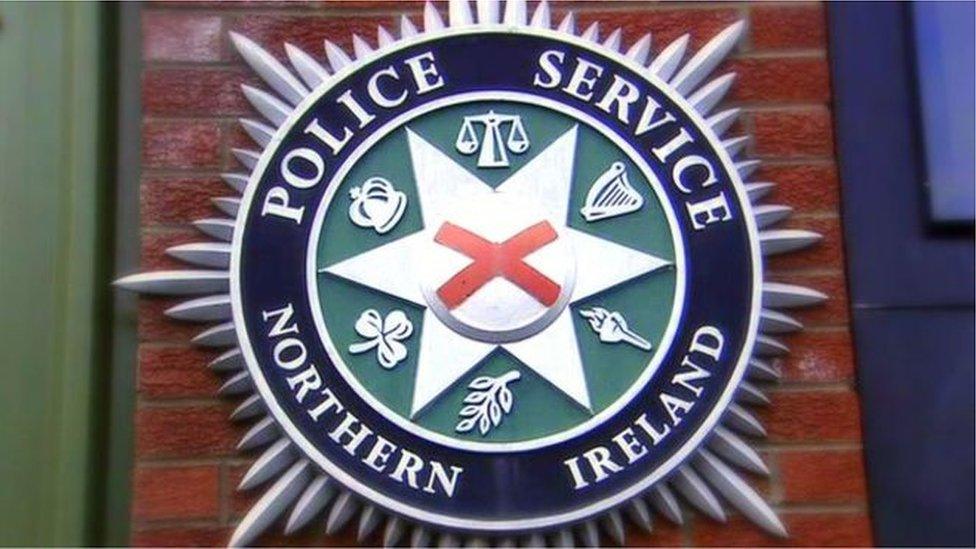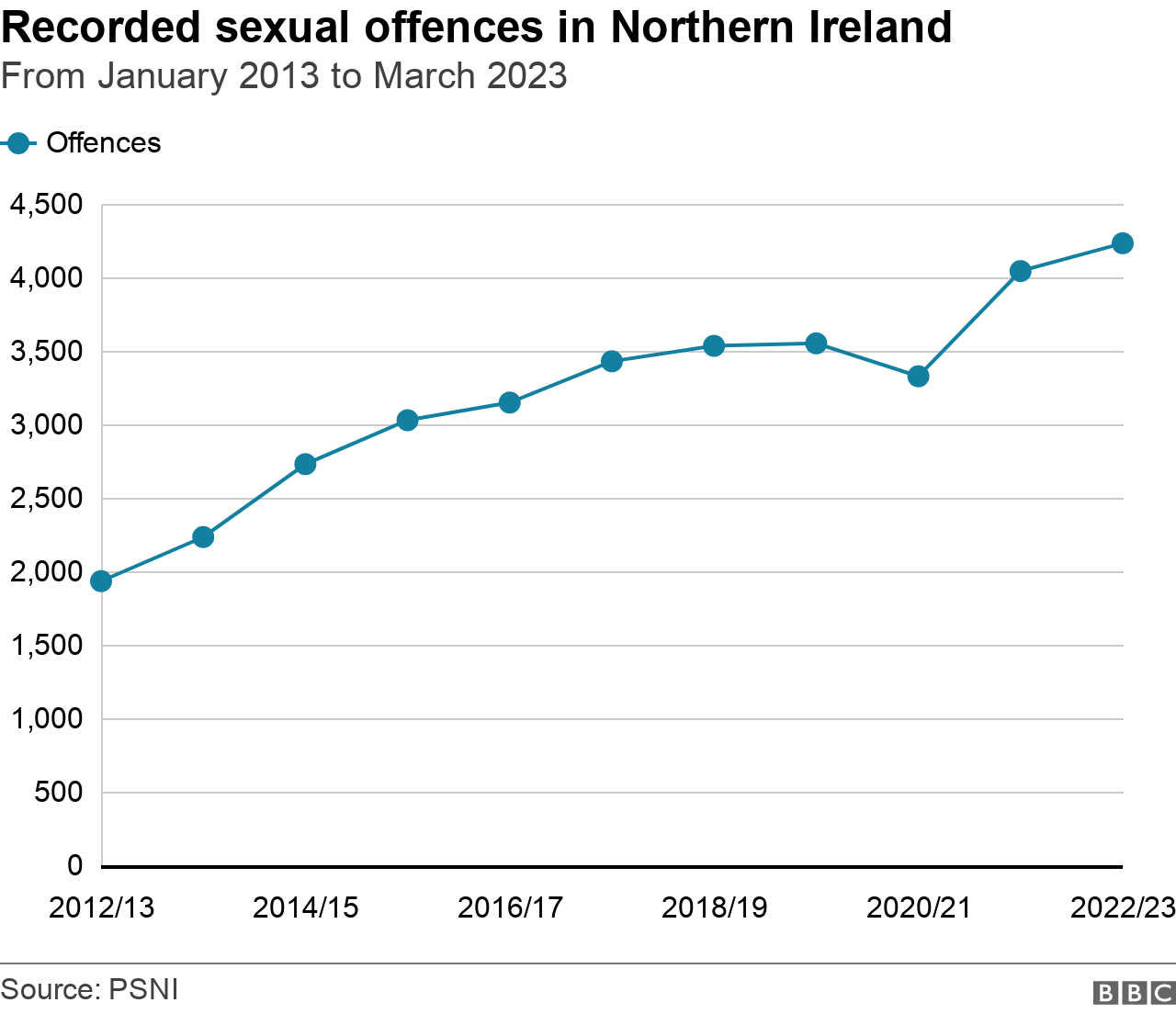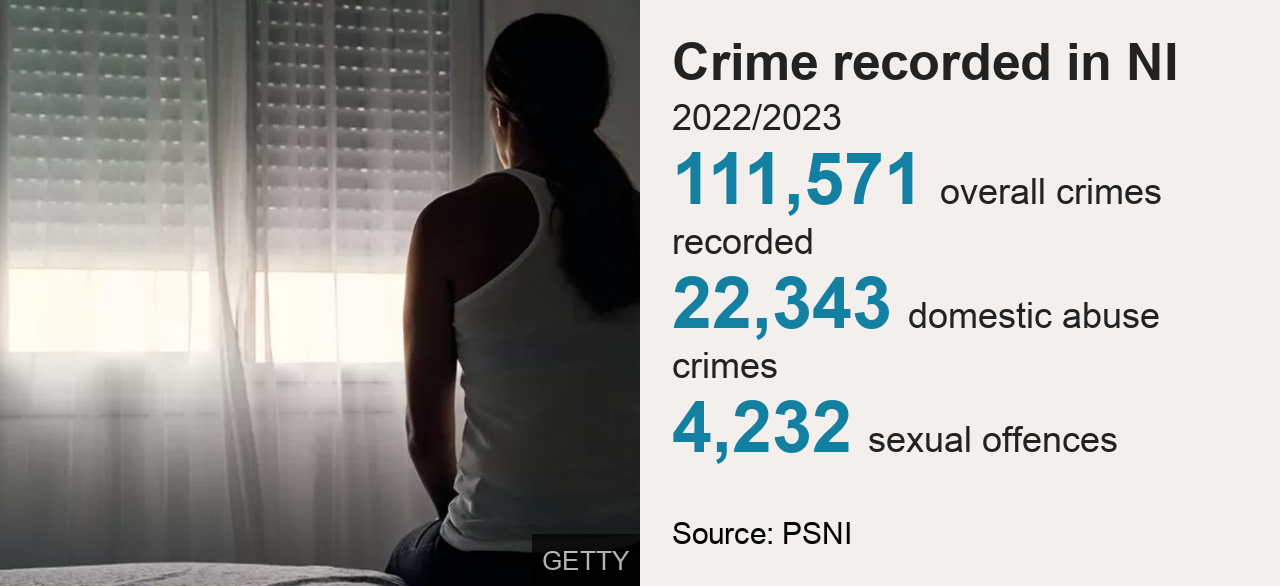Northern Ireland sexual offences reach highest on record for year
- Published

The number of sexual offences reported in Northern Ireland during the last year reached the highest level on record.
There were 4,232 such incidents recorded between April 2022 and March 2023.
This is an increase of 4.7% on the previous year and the number of domestic abuse crimes recorded also increased.
The figures were recorded by the Police Service of Northern Ireland (PSNI).
PSNI Det Supt Gary Reid said: "Even more people in Northern Ireland than ever before are taking that incredibly brave step to come forward and report sexual offences - many after years of suffering in silence.
"As a society, we must continue to dispel harmful myths and move away from a victim blaming culture so more survivors feel empowered to come forward and seek justice."
He added: "Previously, we know that one of the main obstacles facing those coming forward was the fear of not being believed, but we will always listen and take victims seriously."
'Highest on record'
The PSNI publish monthly updates on crime statistics in Northern Ireland.
In the 12 months from April 2022 to March 2023, there were 111,571 crimes recorded across Northern Ireland, an overall increase of 4.9% on the previous 12 months.
Due to the Covid-19 pandemic, lockdown measures were introduced in Northern Ireland on 23 March 2020 which had a substantial impact on the level of all police recorded crime during 2020-21.

The figures were recorded by the Police Service of Northern Ireland (PSNI)
Sexual offences include:
Rape
Sexual assault
Sexual grooming
Exposure
Voyeurism
These offences have been on an upwards trend since the start of the PSNI data series in 1998, with the most recent figures being the highest on record.
The number of rapes recorded between April 2022 and March 2023 also increased by 2% on the previous year - from 1,243 to 1,272.
Historical cases
During the same period, the number of domestic abuse crimes rose to 22,343.
This was an increase of 3.1% on the previous 12 months, and the highest financial year figure recorded since 2004-05.
There can be a large gap between the date of an offence occurring and the date it is reported to the police.
The police say the focus on cases of historical sexual abuse may also have had an impact on increasing the number of non-recent sexual offences reported.
In recent years, the Historical Institutional Abuse (HIA) Inquiry investigated historical allegations of child abuse at 22 residential institutions run by religious, charitable and state organisations across Northern Ireland in a 73-year period.
In March, a campaign was launched to raise awareness of the support available to victims of historical abuse.
This included the establishment of support services and a financial compensation process.
'Tip of the iceberg'
Nexus, one of Northern Ireland's largest charities supporting people affected by sexual abuse, has also seen an increase in calls to its domestic and sexual abuse helpline in the last year.
The number of people who have experienced sexual abuse and called the helpline increased by 75% from 1,927 in 2021-22 to 3,378 in 2022-23.

The charity's chief executive Joanne Barnes said: "It is worrying, but unfortunately not surprising to us at Nexus, that sexual offences have risen, once again, to the highest level recorded.
"It is encouraging that more people are reaching out for advice and support, however we always caveat these numbers as the 'tip of the iceberg', with many of these crimes going unreported and people not reaching out for help and support."
The PSNI said it had also rolled out a number of targeted campaigns, like its child sexual exploitation campaign and Operation Makesafe to help raise awareness and encourage reporting.
PSNI Det Supt Gary Reid added: "The more the public know about the boundaries of sexual consent and what constitutes a sexual crime against them, the more reports we will receive.
"We will continue to raise awareness, support survivors and work with them."